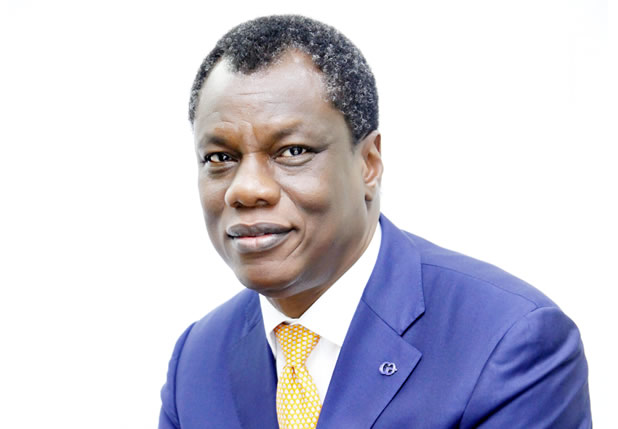ICT
FinTech may strip control from central banks to telecoms regulators — Okere
Published
7 years agoon
By
Olu Emmanuel
A global trend capable of stripping the power of financial and monetary regulations from central banks of countries to their telecoms regulators is emerging.
This was the submission of leading techprenuer and founder, CWG Plc., Mr. Austin Okere in his keynote presentation during a recent seminar organized by Nigeria Information Technology Reporters’ Association (NITRA), in Lagos.
He said in nations where telecoms are allowed to drive mobile money, control of financial activities is gradually tilting towards telecoms regulators. This made him to query how well are the banks and other financial institutions innovating and using digital technology to take advantage of the huge untapped potential in the smaller towns and cities and providing them with the required type and form of financial services?
He explained that the world is getting better at understanding the mechanics of financial inclusion, and the ways that digital technology can accelerate it, stressing among other things that; Digital financial inclusion is a powerful tool for tackling poverty; Digital financial inclusion increases consumer activity and trade; Digital financial inclusion improves the economy of the country which is beneficial even for the wealthy; and financial inclusion will indirectly increase the tax revenue going to the government.
Continuing, CWG founder noted that the Swiss Federal Council is lowering market entry barriers for Fintech just as France’s Central Bank is collaborating with blockchain startups
Nasdaq has executed its first trade on a blockchain and promises to expedite trade clearing and settlement from 3 days to as little as 10 minutes.
Already, settlement risk exposure is reduced by over 99%
Other Stock Exchanges include Australia, Myanmar, Germany, Japan, Korea, London and Toronto are keying into FinTech.
Accenture says investments in fintech increased from $930 million in 2008 to $12 billion by 2015.
Okere also disclosed that central banks are now seeking to issue their own national digital currencies to harnessing the upside of the digital revolution, preserving the existing legal and regulatory set up.
Some of the central banks are now expecting significant cost savings, reduction of operational and fraud risks, strengthened ability to execute monetary policy
Already, some central banks are now issuing digital currency units alongside notes and coins as base moneyStudy projected that broadening access to digital finance tools could increase developing countries’ GDP by an estimated $3.7 trillion by 2025
According to Okere, “Kenya, for example, “mobile money,” which allows users to transfer funds by text message, has helped an estimated 194,000 households escape extreme poverty. The breakthrough there was driven by changes in savings behavior and greater occupational choice, especially for women.
“Tanzania and Mexico implemented systems that require nothing more than a phone number to sign up for the most basic accounts. Programs in both countries have been successful; in Mexico, for example, more than nine million new accounts were opened in the first two years.
“India, meanwhile, is launching a massive digital identification program that collects fingerprints and other biometric data. More than one billion digital profiles have been created since the program began six years ago; today, more than one-third of those profiles are linked to bank accounts.
ALSO SEE: BVN: Panic as Nigerians besiege banks
He noted that with the ease in transacting business with FinTechs, traditional banking is a very difficult time in some parts of the world, stressing that developed countries have typically led the way in traditional financial systems.
Already, emerging markets are leapfrogging to new forms of banking with Fintechs.
Key African example remains the MPESA which has made it possible for a large swathe of the Kenyan population to gain financial inclusion.
Just as 70% of the population in Africa is unbanked, MPESA has more than 60% of Kenya’s 33 million mobile users.
He revealed that a pointer to how mobile money will ravage the banking sector if it had been allowed to be driven by telecoms in Nigeria can be seen from how Diamond’s Yello Mobile Account changed the narrative on its customer base within record time.
Diamond bank had 7m accounts after 23 years, and added 6m more accounts within the first year of launching Diamond ‘Yello Account in partnership with MTN Nigeria. This shows the power of FinTech in stripping financial control powers from the central bank to NCC in the near future when other banks or platforms emerge with latest fintech products.
Fintechs thrives on digital currencies and mainly mobile money services while banks rely on cash and ancillary instruments. The growth in Fintech has forced almost every bank to key in with tailor-made products to remain competitive and industry relevant.
However, in Nigeria, Okere raised salient questions including; if we are following through with the strategy to deploy and sustain digitalized multi-channel approach like using handheld devices, mobiles, cards, micro-ATMs, branches and kiosks for agent banking, with appropriate structures to ensure seamless integration with the existing financial services?
The Columbia Business School, US lecturer also asked if we started making use of data analysis to make services more personalized and combat financial resilience.
Trending

 Comments and Issues2 days ago
Comments and Issues2 days agoAs Ariwoola takes the judiciary to the top of the grease pole

 Business6 days ago
Business6 days agoNMDPRA Chief faces backlash over comment on Dangote Refinery

 Business1 week ago
Business1 week agoGlobal cyber outage disrupts flights, Banks, telecoms, Media

 Business1 week ago
Business1 week agoKPMG criticizes FG’s 50% windfall tax, foresees legal disputes

 Business5 days ago
Business5 days agoZenith Bank retains position as Nigeria’s Tier-1 capital leader

 Education7 days ago
Education7 days agoJAMB reacts to allege age limit by ministry of education

 News6 days ago
News6 days agoPhilip Shaibu officially joins APC, dumps PDP

 Comments and Issues5 days ago
Comments and Issues5 days agoOnanuga and the Surprise from Joe Igbokwe









